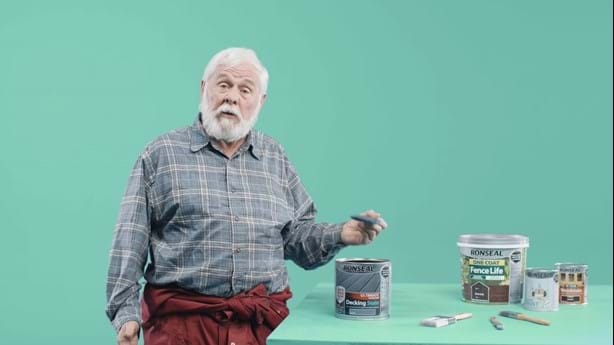Ronseal and Men’s Shed Partnership
Tools, tea and community spirit: How Ronseal and the Men’s Sheds movement are using DIY to improve lives

Life isn’t always easy. And when things change or go wrong it can be hard to find sources of help and support.
After all, where do you go to make new friends as you get older? How do you meet people in a strange town? What can you do to improve your own skills and wellbeing?
The Men’s Shed movement was devised to answer all of these questions and more. Supported by Ronseal, the leading woodcare specialist, it provides men, women and young people, a place to meet and share good times, and a place to learn and refine DIY and other practical skills.
Ronseal’s new partnership with the Men’s Shed movement includes sponsorship of a series of DIY skills sessions at The Manchester Men’s Shed in Moss Side, beginning this summer.
So why DIY? In recent times, the therapeutic benefits of DIY have been become all too clear.
The Men’s Shed Association reports anecdotally the enormously positive effects the groups have on their members, boosting confidence and improving wellbeing.

The power of a tea break
Dedicated ‘Shedder’ Geoff Allison has seen his life change profoundly through his involvement in the movement. His regular shed is a converted former factory in his home town of Dalbeatty in Scotland.
The 76-year-old found himself looking for support as a combination of retirement, and the challenges of caring for his wife, left him feeling isolated. Membership of the Dalbeatty shed has enabled Geoff to build a strong network of friends and to participate in fun and stimulating DIY projects.
“The shed saved me,” he says. “Before I got involved with the shed I was lost, really lost. I was caring for my wife, 24/7 for five years. She has Alzheimer’s and I was looking after her until she became too ill.
“I’d always travelled a lot for work so when that finished I didn’t really have many contacts in the town. You’re rattling round in the house and you can find yourself very cut off, very alone. I was very isolated, I thought, ‘what the hell do I do now?’”
Having heard about the movement, he and a couple of other local men decided to set up a shed. Now, five years on, it’s one of the biggest in the UK – packed with up to 60 members at a time, all working away on a huge range of DIY projects.
“Skills sharing is a great way to break down barriers and get men interested,” says Geoff. “We can all get very involved with what we’re doing, so we ring at bell at 11am to say, ‘drop everything, it’s time for a tea break and a chat’. It’s an amazing place.”
Boosting confidence and building communities
Each shed is a workshop where tools and services are provided either for free or at minimal charge. Anyone is able to drop by and work on anything they want, from building wooden furniture to sculpting handmade objects. Skill sharing is actively encouraged, and time is made for tea breaks and chats so that people can get to know each other.
The movement, which began in Australia, isn’t centralised or formally incorporated. Instead, it has grown organically so that anyone anywhere can set up a shed in a suitable community space. Often others in the community will pitch in to support, with local people donating tools, work benches or by volunteering their time.
Mike Jenn, 72 and from London, spotted the potential of DIY to bring people together. Inspired by the original Australian ‘Shedders’, he founded the UK’s first Men’s Shed in Camden, north London in 2013 and has since watched the movement go from strength to strength across the country.
In the UK alone there are now 492 sheds, and the movement is growing quickly with new sheds opening at a rate of around nine per month. Together, these sheds provide a welcoming social space for more than 11,000 members.
Alongside these benefits, Ronseal’s research identified clear differences in how the generations perceive DIY, with many younger people lacking knowledge or feeling daunted about carrying out practical jobs. This highlights another benefit of the Men’s Shed movement, as younger members are able to get help from skilled or older peers in the form of tips and practical advice. This cross generational learning will also be taken to Facebook as the Shedders have joined forces with Ronseal to create a Pocket Parent, an automated messenger bot that provides responses and tips when prompted with DIY queries making sure DIY skills are being shared in an innovative new way.
Ronseal marketing director Jane Ryder says: “Ronseal has always been about helping people to do their DIY in a simple, no-fuss fashion, and the Men’s Shed movement is a great example of that. These sheds are inclusive, welcoming spaces where anyone can get involved in practicing their skills. It’s exciting to be able to shine a light on the wider benefits of DIY for people’s health and wellbeing.”
Find out more about the Men’s Shed Association.




